
A new study published in the Journal of the American Chemical Society has offered a promising weapon in the fight against mosquito-borne diseases like dengue fever, Zika, and malaria.
The report highlights novel compounds capable of marking proteins within the distinctive, alkaline conditions of the Ae. aegypti digestive system, holding promise for researchers aiming to devise insecticides to combat the species.
The study, titled “Chemical Probes to Interrogate the Extreme Environment of Mosquito Larval Guts,” cites the World Health Organisation (WHO) that mosquito-borne pathogens are responsible for over 500,000 deaths yearly with malaria parasites and arboviruses (from anopheline and culicine mosquitoes, respectively) being primary culprits.
Pointing out other studies, it noted that commonly used mosquito adulticides and larvicides are becoming ineffective as resistance develops.
In the study’s conclusion, the scientists underscore the significance of their findings: “We reported a chemical approach to covalently modify gut proteins of Ae. aegypti mosquito larvae leveraging their unique high pH environment as a triggering mechanism. We describe the design, synthesis, and application of our chemical probes. We demonstrated the efficacy of our probes using SDS PAGE and fluorescence microscopy.
“The procedures and methods developed will be useful to entomologists as an additional proteomic analysis tool during various larval stages that may help identify candidate drug targets to develop new insect control programmes.
“In the future, we envision that our technology will aid in the development of new mosquito larvicides with a high degree of target specificity and the ability to rapidly adapt to changes in field resistance, and thus limit the spread of mosquito-borne illness.
“Finally, the ability to systematically imbue a molecule with pre-programmed logic to match a biological environment should prove broadly useful beyond mosquito larva and their uniquely basic gut.”













